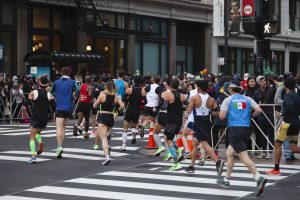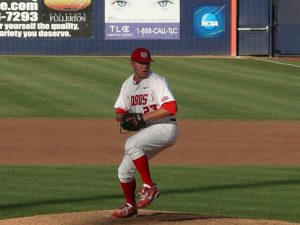Her face contorts with every impact. The heavy bag is strapped to the wall so it doesn’t move when she hits it. Vickie Williams, who is also a vice cop on the city’s South Side, hits much harder than her 116-pound frame would suggest.
Williams grew up in Englewood on Chicago’s South Side. Her parents provided a stable home. She credits sports with giving her an outlet for her energy and a productive way to spend her time outside of school.
She played basketball, volleyball and softball through out high school. “Sports kept me out of trouble,” Williams said. ” Sports helped me become who I am today.”

Over the last century women have slowly broken down the barriers of traditional gender roles in society. The world of sports has opened more and more to allow them the opportunities to compete and enrich themselves with athletics.
At the 2004 and 2008 Olympic games, boxing was the only sport in which women were not allowed to compete.
The Golden Gloves in Chicago has been including women in the tournament since 1999. In April of 2012 Vickie Williams won the bantam weight senior women’s title. She was 29 years old and had been boxing for just over a year.
Her trainer Rick Ramos recognized her natural ability when she came to his gym to take a “boxing 101” class. He saw her working out on a heavy bag and was surprised by the strength in her strikes he said.
Ramos was most impressed by her left hook. “She had a lot of strength and energy and she threw it hard with the intent to hurt,” he said.
Williams was the first woman Ramos took on to train for amateur competition. When he asked her if she wanted train seriously she said she was “dying to fight.” Her enthusiasm sealed the deal.
“With the combination of her left hook and the fact that she was dying to fight I think we had something,” Ramos said.
As a young woman she never imagined that she could be a boxer. She had no female role models who boxed growing up. She watched professional boxing with her dad when she was young and always loved it.
It wasn’t until she joined the police force that she considered boxing. Working for the Chicago Police Department is also something she credits her father for encouraging.
“He was always a security guard,” Williams said. “He wanted to be an officer but he couldn’t because he hadn’t stayed in school.”
While putting herself through college working at a grocery store, Williams heard that the police force was giving the entrance exam. She had changed majors twice in school but this, she knew, was right where she wanted to be.
Being a cop isn’t a typical job. Williams said it’s more of a calling. “You have to have something in you that wants to help.”
She quickly found her way on to a tactical plain clothes team that goes out looking for drugs, guns, and gangs.
After working the streets for a couple of years she went looking for a martial art that would help her on the job. She searched the internet and found the Chicago Boxing Club in Bridgeport. Suddenly boxing became a possibility. She enrolled in a beginners class to learn the sport from scratch.
Vickie Williams has become a role model to other women who work out at the Chicago Boxing Club.
Mary Lou Bravo has been training with Williams for a year. She teaches aerobic classes at the Chicago Boxing Club and is studying forensic sciences. Williams has inspired her to pursue her interest in criminal justice. Bravo also credits her for proving that women can be as tough as men in the ring.
When she first saw Williams work-out she was a little intimidated. “Man, this chick’s tough,” Bravo recalled thinking. “I kinda wanted to be the same…work out as hard as her.”
Bravo and Williams have sparred often in the gym. Though Williams is the better fighter, Bravo said she’s gracious and generous with her advice.
Missy Ritze is not a boxer but has been a martial artist for more than 10 years. She works out at the boxing club and sees Williams train on a regular basis. “She’s a bad ass,” Ritze said. “She’s also a really nice person too.”
Some stigmas continue to haunt women in this male dominated sport. Women are considered too passive to be good fighters and if they are good fighters then they are considered, by some, to be flawed.
Hal Adonis, the ex-president of USA Boxing , which is the American amateur boxing association that over sees all boxing competitions and clinics, told the New Yorker magazine earlier this year that half the women that are involved in boxing were either abused as children or gay. He went on to say that he would discourage any young woman who was not abused from getting involved with boxing.
Adonis was stripped of his position over the remarks and the International Boxing Association (AIBA) disciplined USA Boxing for not removing him entirely from the organization.
USA Boxing did not respond to a request to comment for this article.
In October the Associated Press reported that the president of USA Boxing, Charles Butler, said in a letter to AIBA, “Remarks that discriminate against large groups of our athletes based on race or gender and associate the sport of boxing with child abuse are totally foreign to our membership.”
Tom Barnes is a professional sports photographer and for the last 10 years, he has specialized in mixed martial arts and boxing. Barnes believes that there is a resistance to women boxers because the audience is older and less accepting of changing social roles. “Women just don’t have the draw that men do for boxing.” Barnes said. ” It’s because the crowds are older.”
Gary Merrit has been judging professional boxing since 1979. He is a member of the International Boxing Federation and has judged bouts all over the world including several world title bouts.
When he began judging fights, there were no women in the sport. People then didn’t take women fighters seriously because they were thought to be too gentle to make for an exciting fight.
“You don’t always think of women as being very aggressive,” Merrit said. “But they’ve proved different. A lot of them are more aggressive than the men to be honest.”
As good female fighters began to emerge in the 1980s, women’s status in the sport grew. Merrit says that he often prefers women’s bouts because they’re more action packed.
For women, the rounds are two minutes instead if three.
“They can really put out more effort in two minutes than you can in three,” Merrit said.
In 2012, after being petitioned by the AIBA, women competed for the first time in the Olympic boxing tournament.
Vickie Williams came to boxing to give her an edge on the street. She’s never needed to use her fighting skills as a police officer. The discipline from training has helped her though.
“It pushes you,” she said. “If I can give my all in here I can give my all at work. If I give my all at work I can give my all in here. It pushes me to be a better officer.”












Be First to Comment